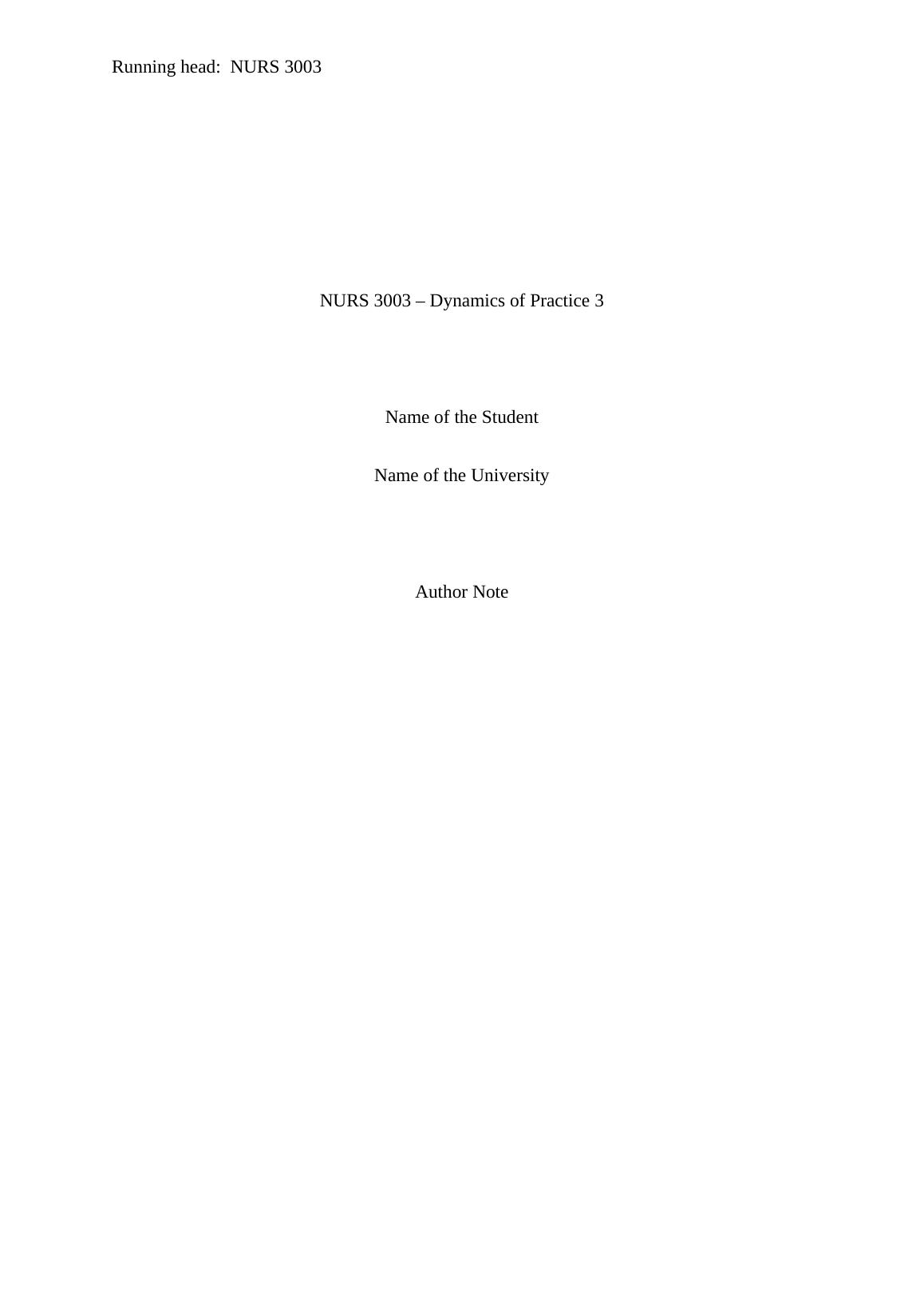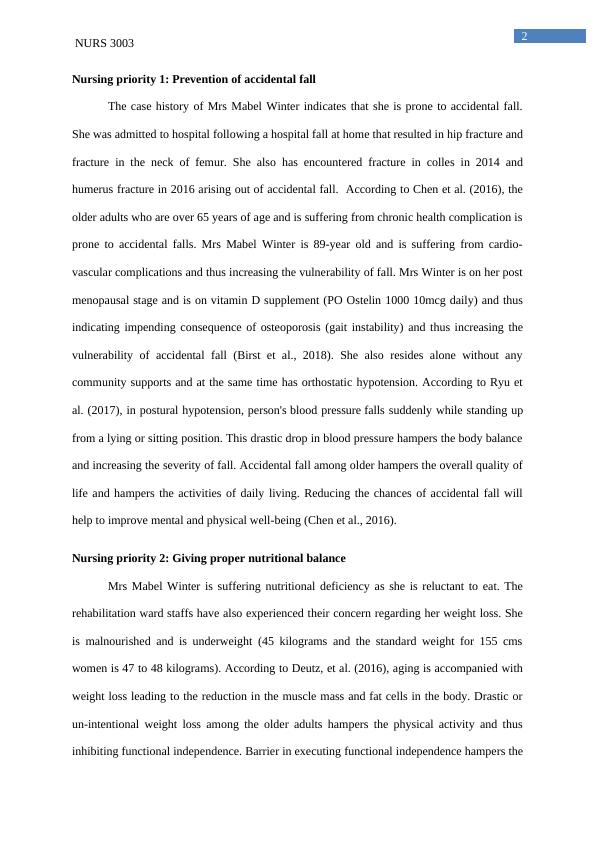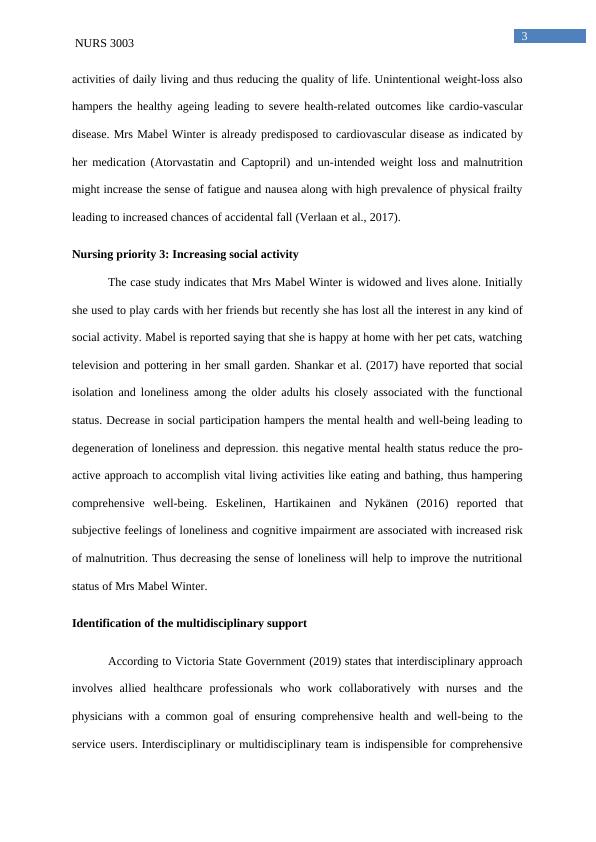Identifying Clinical Priorities and Multidisciplinary Support for Mrs Mabel Winter
Added on 2023-01-18
16 Pages4677 Words43 Views
Running head: NURS 3003
NURS 3003 – Dynamics of Practice 3
Name of the Student
Name of the University
Author Note
NURS 3003 – Dynamics of Practice 3
Name of the Student
Name of the University
Author Note

1
NURS 3003
Introduction
According to Australian Institute of Health and Welfare [AIHW] (2019), chronic
diseases are long lasting condition with persistent effects. The economic and social
consequences of the chronic health diseases hamper the overall well-being of the individuals.
In Australia, chronic diseases are becoming increasingly popular. Eight main chronic diseases
reported by AIHW include asthma, cancer, arthritis, back pain, chronic obstructive
pulmonary disease, cardiovascular disease, and diabetes and mental health condition. When
two or more chronic diseases co-exist then the overall burden of disease is increased leading
to the generation of complex care needs. According to Bujold et al. (2017) chronic diseases
are long lasting condition with persistent effects. The economic and social consequences of
the chronic health diseases hamper the overall well-being of the individuals. In Australia,
chronic diseases are becoming increasingly popular. Eight main chronic diseases reported by
AIHW include asthma, cancer, arthritis, back pain, chronic obstructive pulmonary disease,
cardiovascular disease, and diabetes and mental health condition. When two or more chronic
diseases co-exist then the overall burden of disease is increased leading to the generation of
complex care needs (Bujold et al., 2017). The following essay aims to identify three clinical
priority of Mrs Mabel Winter, an 89-year old widowed lady. She has complex care needs as
she has recently encountered injury in the hip and neck of femur due to accidental and also
under the medication of cardiovascular disease. The identification of three complex or
chronic care needs of Mrs Mabel Winter will be followed by identification of the
multidisciplinary team members and resources that will be important to avoid the future
chances of unwanted hospitalisation. At the end, the essay will highlight the potential barriers
to care along with actual or potential medication needs for Mrs Mabel Winter. The overall
care plan will facilitate Mrs Mabel transition to home from hospital.
Identification of patient's need
NURS 3003
Introduction
According to Australian Institute of Health and Welfare [AIHW] (2019), chronic
diseases are long lasting condition with persistent effects. The economic and social
consequences of the chronic health diseases hamper the overall well-being of the individuals.
In Australia, chronic diseases are becoming increasingly popular. Eight main chronic diseases
reported by AIHW include asthma, cancer, arthritis, back pain, chronic obstructive
pulmonary disease, cardiovascular disease, and diabetes and mental health condition. When
two or more chronic diseases co-exist then the overall burden of disease is increased leading
to the generation of complex care needs. According to Bujold et al. (2017) chronic diseases
are long lasting condition with persistent effects. The economic and social consequences of
the chronic health diseases hamper the overall well-being of the individuals. In Australia,
chronic diseases are becoming increasingly popular. Eight main chronic diseases reported by
AIHW include asthma, cancer, arthritis, back pain, chronic obstructive pulmonary disease,
cardiovascular disease, and diabetes and mental health condition. When two or more chronic
diseases co-exist then the overall burden of disease is increased leading to the generation of
complex care needs (Bujold et al., 2017). The following essay aims to identify three clinical
priority of Mrs Mabel Winter, an 89-year old widowed lady. She has complex care needs as
she has recently encountered injury in the hip and neck of femur due to accidental and also
under the medication of cardiovascular disease. The identification of three complex or
chronic care needs of Mrs Mabel Winter will be followed by identification of the
multidisciplinary team members and resources that will be important to avoid the future
chances of unwanted hospitalisation. At the end, the essay will highlight the potential barriers
to care along with actual or potential medication needs for Mrs Mabel Winter. The overall
care plan will facilitate Mrs Mabel transition to home from hospital.
Identification of patient's need

2
NURS 3003
Nursing priority 1: Prevention of accidental fall
The case history of Mrs Mabel Winter indicates that she is prone to accidental fall.
She was admitted to hospital following a hospital fall at home that resulted in hip fracture and
fracture in the neck of femur. She also has encountered fracture in colles in 2014 and
humerus fracture in 2016 arising out of accidental fall. According to Chen et al. (2016), the
older adults who are over 65 years of age and is suffering from chronic health complication is
prone to accidental falls. Mrs Mabel Winter is 89-year old and is suffering from cardio-
vascular complications and thus increasing the vulnerability of fall. Mrs Winter is on her post
menopausal stage and is on vitamin D supplement (PO Ostelin 1000 10mcg daily) and thus
indicating impending consequence of osteoporosis (gait instability) and thus increasing the
vulnerability of accidental fall (Birst et al., 2018). She also resides alone without any
community supports and at the same time has orthostatic hypotension. According to Ryu et
al. (2017), in postural hypotension, person's blood pressure falls suddenly while standing up
from a lying or sitting position. This drastic drop in blood pressure hampers the body balance
and increasing the severity of fall. Accidental fall among older hampers the overall quality of
life and hampers the activities of daily living. Reducing the chances of accidental fall will
help to improve mental and physical well-being (Chen et al., 2016).
Nursing priority 2: Giving proper nutritional balance
Mrs Mabel Winter is suffering nutritional deficiency as she is reluctant to eat. The
rehabilitation ward staffs have also experienced their concern regarding her weight loss. She
is malnourished and is underweight (45 kilograms and the standard weight for 155 cms
women is 47 to 48 kilograms). According to Deutz, et al. (2016), aging is accompanied with
weight loss leading to the reduction in the muscle mass and fat cells in the body. Drastic or
un-intentional weight loss among the older adults hampers the physical activity and thus
inhibiting functional independence. Barrier in executing functional independence hampers the
NURS 3003
Nursing priority 1: Prevention of accidental fall
The case history of Mrs Mabel Winter indicates that she is prone to accidental fall.
She was admitted to hospital following a hospital fall at home that resulted in hip fracture and
fracture in the neck of femur. She also has encountered fracture in colles in 2014 and
humerus fracture in 2016 arising out of accidental fall. According to Chen et al. (2016), the
older adults who are over 65 years of age and is suffering from chronic health complication is
prone to accidental falls. Mrs Mabel Winter is 89-year old and is suffering from cardio-
vascular complications and thus increasing the vulnerability of fall. Mrs Winter is on her post
menopausal stage and is on vitamin D supplement (PO Ostelin 1000 10mcg daily) and thus
indicating impending consequence of osteoporosis (gait instability) and thus increasing the
vulnerability of accidental fall (Birst et al., 2018). She also resides alone without any
community supports and at the same time has orthostatic hypotension. According to Ryu et
al. (2017), in postural hypotension, person's blood pressure falls suddenly while standing up
from a lying or sitting position. This drastic drop in blood pressure hampers the body balance
and increasing the severity of fall. Accidental fall among older hampers the overall quality of
life and hampers the activities of daily living. Reducing the chances of accidental fall will
help to improve mental and physical well-being (Chen et al., 2016).
Nursing priority 2: Giving proper nutritional balance
Mrs Mabel Winter is suffering nutritional deficiency as she is reluctant to eat. The
rehabilitation ward staffs have also experienced their concern regarding her weight loss. She
is malnourished and is underweight (45 kilograms and the standard weight for 155 cms
women is 47 to 48 kilograms). According to Deutz, et al. (2016), aging is accompanied with
weight loss leading to the reduction in the muscle mass and fat cells in the body. Drastic or
un-intentional weight loss among the older adults hampers the physical activity and thus
inhibiting functional independence. Barrier in executing functional independence hampers the

3
NURS 3003
activities of daily living and thus reducing the quality of life. Unintentional weight-loss also
hampers the healthy ageing leading to severe health-related outcomes like cardio-vascular
disease. Mrs Mabel Winter is already predisposed to cardiovascular disease as indicated by
her medication (Atorvastatin and Captopril) and un-intended weight loss and malnutrition
might increase the sense of fatigue and nausea along with high prevalence of physical frailty
leading to increased chances of accidental fall (Verlaan et al., 2017).
Nursing priority 3: Increasing social activity
The case study indicates that Mrs Mabel Winter is widowed and lives alone. Initially
she used to play cards with her friends but recently she has lost all the interest in any kind of
social activity. Mabel is reported saying that she is happy at home with her pet cats, watching
television and pottering in her small garden. Shankar et al. (2017) have reported that social
isolation and loneliness among the older adults his closely associated with the functional
status. Decrease in social participation hampers the mental health and well-being leading to
degeneration of loneliness and depression. this negative mental health status reduce the pro-
active approach to accomplish vital living activities like eating and bathing, thus hampering
comprehensive well-being. Eskelinen, Hartikainen and Nykänen (2016) reported that
subjective feelings of loneliness and cognitive impairment are associated with increased risk
of malnutrition. Thus decreasing the sense of loneliness will help to improve the nutritional
status of Mrs Mabel Winter.
Identification of the multidisciplinary support
According to Victoria State Government (2019) states that interdisciplinary approach
involves allied healthcare professionals who work collaboratively with nurses and the
physicians with a common goal of ensuring comprehensive health and well-being to the
service users. Interdisciplinary or multidisciplinary team is indispensible for comprehensive
NURS 3003
activities of daily living and thus reducing the quality of life. Unintentional weight-loss also
hampers the healthy ageing leading to severe health-related outcomes like cardio-vascular
disease. Mrs Mabel Winter is already predisposed to cardiovascular disease as indicated by
her medication (Atorvastatin and Captopril) and un-intended weight loss and malnutrition
might increase the sense of fatigue and nausea along with high prevalence of physical frailty
leading to increased chances of accidental fall (Verlaan et al., 2017).
Nursing priority 3: Increasing social activity
The case study indicates that Mrs Mabel Winter is widowed and lives alone. Initially
she used to play cards with her friends but recently she has lost all the interest in any kind of
social activity. Mabel is reported saying that she is happy at home with her pet cats, watching
television and pottering in her small garden. Shankar et al. (2017) have reported that social
isolation and loneliness among the older adults his closely associated with the functional
status. Decrease in social participation hampers the mental health and well-being leading to
degeneration of loneliness and depression. this negative mental health status reduce the pro-
active approach to accomplish vital living activities like eating and bathing, thus hampering
comprehensive well-being. Eskelinen, Hartikainen and Nykänen (2016) reported that
subjective feelings of loneliness and cognitive impairment are associated with increased risk
of malnutrition. Thus decreasing the sense of loneliness will help to improve the nutritional
status of Mrs Mabel Winter.
Identification of the multidisciplinary support
According to Victoria State Government (2019) states that interdisciplinary approach
involves allied healthcare professionals who work collaboratively with nurses and the
physicians with a common goal of ensuring comprehensive health and well-being to the
service users. Interdisciplinary or multidisciplinary team is indispensible for comprehensive

End of preview
Want to access all the pages? Upload your documents or become a member.
Related Documents
Consumer-directed care Parminder Kaur Assignmentlg...
|21
|6238
|26
Nursing Care for Older Adults with Complex Needslg...
|17
|4898
|70
